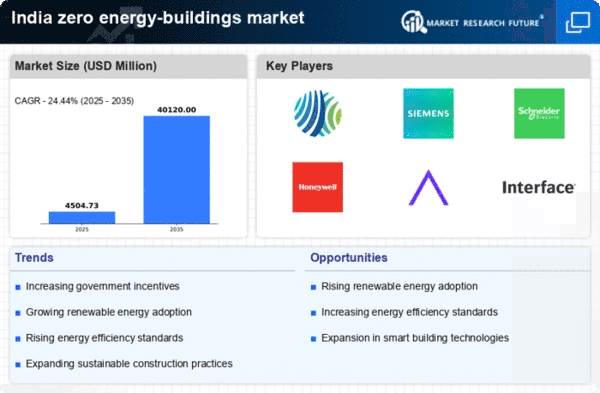Rising Energy Costs
The increasing cost of energy in India is a critical driver for the zero energy-buildings market. With energy prices projected to rise by 5% annually, building owners and developers are seeking ways to mitigate these costs. Zero energy buildings, which generate as much energy as they consume, present a viable solution to this challenge. By investing in renewable energy technologies such as solar panels and energy-efficient systems, stakeholders can significantly reduce their reliance on grid electricity. This shift not only lowers operational costs but also enhances the market appeal of properties. As energy expenses continue to escalate, the zero energy-buildings market is likely to see heightened interest from both commercial and residential sectors, as the financial benefits become increasingly apparent.
Technological Integration
The integration of advanced technologies is transforming the zero energy-buildings market in India. Innovations in energy management systems, smart grids, and building automation are enabling more efficient energy use and generation. For example, the adoption of Internet of Things (IoT) devices allows for real-time monitoring and optimization of energy consumption. As of 2025, it is estimated that around 40% of new buildings will incorporate smart technologies, enhancing their energy performance. This technological evolution not only improves the operational efficiency of buildings but also supports the transition towards renewable energy sources. Consequently, the zero energy-buildings market is poised for growth as these technologies become more accessible and affordable, driving widespread adoption across various building types.
Sustainability Initiatives
Sustainability initiatives are gaining traction in India, significantly impacting the zero energy-buildings market. With increasing awareness of climate change and environmental degradation, both consumers and businesses are prioritizing sustainable practices. The Indian government has set ambitious targets for renewable energy generation, aiming for 500 GW by 2030. This commitment encourages the development of zero energy buildings, which align with national sustainability goals. As organizations strive to enhance their corporate social responsibility (CSR) profiles, the demand for energy-efficient and environmentally friendly buildings is likely to rise. This trend not only supports the zero energy-buildings market but also fosters a culture of sustainability within the construction industry, encouraging innovation and investment in green technologies.
Regulatory Framework Enhancements
The regulatory framework in India is evolving to support the zero energy-buildings market. The government has introduced various building codes and standards aimed at promoting energy efficiency. For instance, the Energy Conservation Building Code (ECBC) mandates energy-saving measures in commercial buildings, which indirectly encourages the adoption of zero energy principles. As of 2025, approximately 30% of new commercial buildings are expected to comply with these codes, fostering a conducive environment for zero energy initiatives. This regulatory push not only enhances energy performance but also aligns with India's commitment to reducing greenhouse gas emissions. The zero energy-buildings market stands to benefit significantly from these regulatory enhancements, as they create a structured pathway for developers and builders to follow, ensuring compliance and promoting sustainable construction practices.
Urbanization and Population Growth
Urbanization and population growth in India are driving the demand for zero energy buildings. As urban areas expand, the need for sustainable housing solutions becomes increasingly critical. By 2025, it is projected that over 50% of India's population will reside in urban centers, leading to heightened energy consumption. Zero energy buildings offer a practical solution to this challenge, as they can accommodate growing populations while minimizing environmental impact. The integration of renewable energy sources in these buildings not only addresses energy demands but also contributes to urban resilience. As cities grapple with the challenges of rapid urbanization, the zero energy-buildings market is likely to experience robust growth, driven by the necessity for sustainable urban development.
















